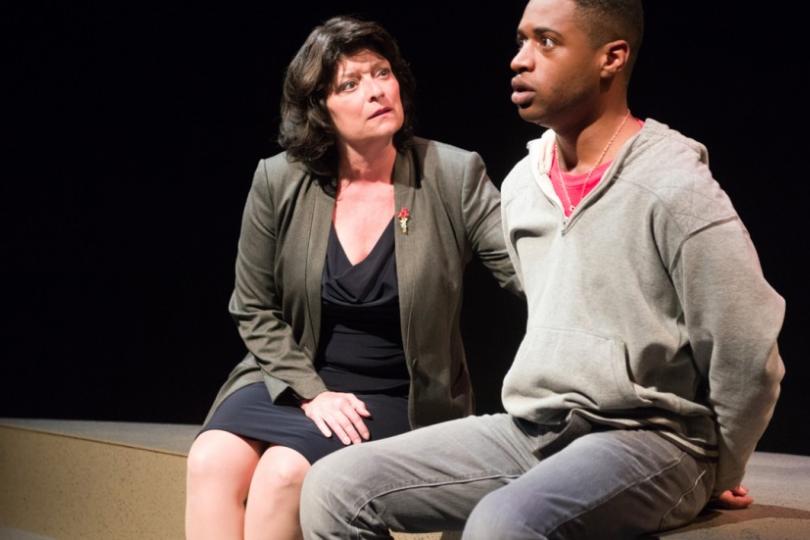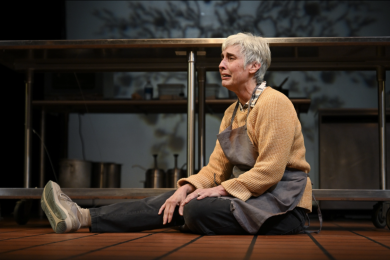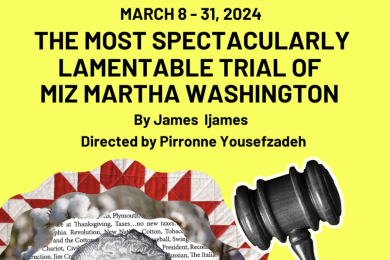Voices you can't ignore

I am excited about Prep. I am excited both for what it is and for what it represents: this is a compact, poetic, and powerfully-acted piece of evidence that there are playwrights out there who are looking at the anger and grief underneath our country’s systemic racism, and refusing to flinch.
Playwright Tracey Scott Wilson wrote the play, now being premiered at the Pillsbury House Theatre, after conducting interviews with both children and adults regarding racial tension in Minneapolis. She then distilled those many voices down to three: Chris (Kory LaQuess Pullam) and Oliver (Ryan Colbert), two teenagers struggling in very different ways to cope with the shooting death of a close friend, and Miss Michelle (Jodi Kellogg), the principal of their public high school, West Side Prep.
There are so many ways this play could have gone astray and didn’t. In listing everything that Prep isn’t, I hope to be able get closer to what it is.
Prep is not just another treatise on the broken public school system – or even worse, the story of a white woman saving a couple of African-American students. It isn’t about what happens in the classroom at all, but rather about what school represents to students whose lives are defined by struggle and uncertainty. From Miss Michelle’s reticence to allow police officers into the cafeteria, to the text messages Oliver keeps getting about a fight he was in the night before, there is evidence everywhere that the school’s walls are permeable. Far from the refuge schools are meant to be, West Side Prep ends up being yet another site of potential violence.
Prep also isn’t an angry tirade about communities that have been systematically denied equal access to jobs and education. There is a strong current of anger underneath everything the boys say, but it isn’t the kind of wrath that unleashes itself on individuals. Chris is angry at a society where a friend, unaffiliated with any gang and seemingly without provocation, can get shot on his porch; Oliver is angry at a world that can lead someone to believe his life is only meaningful if he can die for a cause. This is an outrage that has no target and no single voice: what kind of catchphrase could sum up the sinking sensation of being in an unwinnable situation?
Respect for reality, and you
Another thing Prep does not have is a thesis, and of all of the aspects of the play that ring true, this may be where it is closest to life. Each character is drawn with enough specificity that it is impossible to generalize to an entire community. Miss Michelle is a hard-working, well-meaning woman who resists getting ground down by repeated setbacks, but she also has a really significant (and potentially devastating) blind spot when it comes to inspiring her students. Chris is a fervent Christian who believes that martyrdom is the only way to kickstart a national movement, while Oliver is just trying to get by – but in the end, neither one of them provides an answer to the blatantly unequal opportunities compared to, say, the private school down the road.
Using precisely-drawn characters to bring complex social forces to life, Wilson resists leading the audience down a marked path to a clearly defined conclusion. In refusing to moralize or even make recommendations, she shows the utmost respect to her audience, her characters, and the real individuals whose experiences she drew upon when writing the play. After all, if it was easy to solve all the problems tied to urban poverty – underfunded schools, racial tensions, hostile relationships with law enforcement, and the list goes on – then someone would have done it already. Prep doesn’t insult our intelligence by proposing an easy solution.
The utility of poetry
Wilson’s writing itself also resists reductionist interpretations. It takes a moment to adjust to her style, which is colored with internal rhyme and flirts with poetic meter. It’s a form of narration that is somewhere between natural speech and rap, and it feels stilted during Miss Michelle’s opening monologue. But it’s easy to fall into the rhythm of Wilson’s poetry, and the side benefit is that her stylized speech makes it clear that she isn’t quoting from a single source. Poetry suggests a more universal and humanistic approach: this isn’t a case study; this is an outcry.
Although Prep is a play that refuses a long list of dangerous tropes, the vision it proposes is not bleak. Each time it seems to say “no” – no to easy answers or quick condemnations, no to nebulous expressions of rage, no to trite expressions of optimism – the play also reaches out to its characters with warmth and compassion. Their aspirations, as well as their flaws, are portrayed with the utmost humanity by all three actors. Pullam and Colbert deliver stunning performances as Chris and Oliver, but that isn’t to say that Kellogg doesn’t make Miss Michelle a compelling character as well. Rather, it seems appropriate to me that the role of the white administrator takes something of a back seat to a pair of voices who are given the stage much less frequently and with much less room for nuance.
Statistics were just released by the U.S. Census Bureau that while Minnesota’s median household income has been holding fairly steady at around $61,000 for the last several years, median income for African-Americans in the state fell by $4000 from 2013 to 2014—from $31,021 to $27,026. It is easy to speak sociologically about income disparities and employment opportunities, and for those sociological questions, we may ultimately be able to find answers in policy. But while we struggle to improve labor conditions, education, and social services, we can’t neglect the cultural battle to represent and humanize the communities that most need to be heard. Tracey Scott Wilson, director Noël Raymond, and the cast of Prep have embraced these issues in all of their impossible nuance, knowing that the more complex the problem, the more desperately it needs to be solved.




